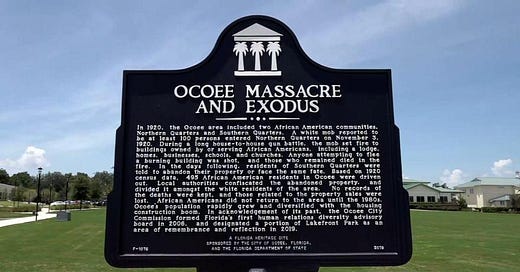The Ocoee Race Massacre
Many are working toward erasing this American history from the schools and the public
Photo Credit: CNN
Issue #371 American History August 22, 2023
The Ocoee Race Massacre, one of the deadliest incidents of racial violence in American history, occurred on November 2, 1920, in Ocoee, Florida. This brutal event, fueled by racial tensions and voter suppression, resulted in the deaths of an estimated 30 to 60 African Americans and the destruction of their homes and businesses.
According to Ann V. Collins in the Oxford Research Encyclopedias, "...between the turbulent months of April and October 1919, racial violence reached a peak in the United States. Some twenty-six white-on-black massacres took place across the country. Author and civil rights activist James Weldon Johnson dubbed this terrible period the Red Summer as a way to characterize pervasive racial hostility and for the blood spilled in its wake."
In 1921, the Tulsa Race Massacre occurred, and in 1923, in the Black town of Rosewood, Florida a racially motivated massacre of over 30 Black people and the destruction of a black town took place.
Despite its significance, the 1920 Ocoee Race Massacre remains largely unknown and neglected in present-day discussions of American history.
In the early 20th century, racial tensions were high in the United States, particularly in the South, where Jim Crow laws enforced racial segregation and discrimination. African Americans faced systemic racism and were denied basic civil rights, including the right to vote.
The Ocoee race massacre was sparked by a contentious local election on November 2, 1920, in which Mose Norman, an African American man, attempted to vote. This challenged the established white power structure and incited fear and anger among white residents. A white mob gathered, determined to prevent African Americans from voting and maintain their dominance.
As news of Norman's attempt to vote spread, violence erupted in Ocoee. African American homes and businesses were targeted, looted, and set ablaze. African American residents were harassed, beaten, and killed. The violence lasted for days, leaving a trail of destruction and trauma in its wake.
After the Black residents of Ocoee fled, their properties were seized by the town authorities and sold to white buyers for pennies on the dollar. Millions of dollars in Black wealth were lost forever.
However, the history of the Ocoee race massacre has been largely erased or neglected in modern times. Several factors contribute to this erasure:
The education system, especially in Florida and other Southern States, often fails to adequately teach the history of racial violence and its impact on marginalized communities. The Ocoee race massacre is rarely included in history textbooks or curricula, leaving future generations unaware of this significant event.
Systemic racism continues to play a role in the erasure of the Ocoee race massacre because the structures and institutions that perpetuate racial inequality often fail to prioritize the preservation and acknowledgment of historical truths that challenge the dominant narrative.
The 1920 Ocoee Race Massacre is a harrowing reminder of the racial violence and systemic racism that has been a part of American history since the beginning of this country. Its erasure in the present day highlights the importance of preserving and acknowledging historical truths.
Let us know your thoughts about what new information you learned in the comments or in the Substack Notes feature.
You can always leave any questions in the comments or email us.
You can also receive up to six months of a paid subscription for referring people to us with the Share Button or the Refer Button.
Our goal is to make “We Are Speaking” into a multi-dimensional written and audio/visual publication and resource for you.
It will take financial resources to grow our publication.
Please consider becoming a paid subscriber for $5/month or less to access all of the articles, the entire archive, and other benefits.





I actually live in Ocoee, FL, which today is a suburb of Orlando and a melting pot of different races and immigrants. My children learned about the Ocoee massacre through some discussions in school but, as you noted, it wasn't in any of their textbooks. My guess is that those types of discussions are not happening currently as Governor Ron DeSantis has made anything related to African American history taboo and told teachers they'll lose their job if they don't conform to his guidelines.